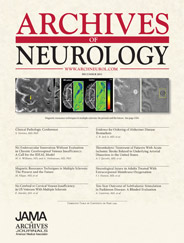
美国研究人员日前在美国学术刊物《神经病学文献》网络版上报告说,一种名为脂联素的激素是女性患痴呆和早老性痴呆的潜在风险因子。
美国塔夫茨大学研究人员测量了840人血液中的一些指标,这些人中有541人为女性。测量指标包括葡萄糖、胰岛素、糖化白蛋白、C反应蛋白、磷脂酶A2以及脂联素。
在平均13年的跟踪研究中,这些人中共有159人患痴呆,其中125人患的是早老性痴呆。在调整了其他风险因素后,研究人员发现,脂联素水平较高的女性患痴呆及早老性痴呆的风险也较高。
脂联素是脂肪细胞分泌的一种激素。研究人员表示,早老性痴呆患者大脑中的胰岛素信号传递失灵,而脂联素能增强胰岛素的敏感性,理论上讲,较高的脂联素水平应当有利于阻止认知能力下降,然而数据却显示,脂联素水平升高与女性患痴呆及早老性痴呆的风险增加有关。
早老性痴呆又称阿尔茨海默氏症,是最常见的痴呆类型,患者大脑中一种淀粉状蛋白出现异常堆积,脑细胞受损,记忆能力下降。目前尚没有疗法能治愈这一疾病。

 Biomarkers for Insulin Resistance and Inflammation and the Risk for All-Cause Dementia and Alzheimer Disease
Biomarkers for Insulin Resistance and Inflammation and the Risk for All-Cause Dementia and Alzheimer Disease
Thomas M. van Himbergen, PhD; Alexa S. Beiser, PhD; Masumi Ai, MD; Sudha Seshadri, MD; Seiko Otokozawa, MT; Rhoda Au, PhD; Nuntakorn Thongtang, MD; Philip A. Wolf, MD; Ernst J. Schaefer, MD
Objective To investigate the contribution of biomarkers of glucose homeostasis (adiponectin, glucose, glycated albumin, and insulin levels) and inflammation (high-sensitivity C-reactive protein and lipoprotein-associated phospholipase A2 levels) to the risk of developing Alzheimer disease (AD) and all-cause dementia.
Design Prospective cohort study.
Setting Dementia-free Framingham Heart Study participants had sera measured for these biomarkers at the 19th biennial examination (1985-1988) and were followed up prospectively for the development of AD and all-cause dementia.
Participants Eight hundred forty (541 women, median age of 76 years) subjects participated in the study.
Main Outcome Measures We used sex-pooled and sex-specific multivariable Cox proportional hazards models adjusted for age, education, body mass index, recent change in weight, APOE 4 allele status, and plasma docosahexaenoic acid levels to determine association of these biomarkers with the development of all-cause dementia and AD.
Results Over a mean follow-up period of 13 years, 159 persons developed dementia (including 125 with AD). After adjustment for other risk factors, only adiponectin in women was associated with an increased risk of all-cause dementia (hazard ratio [HR], 1.29; 95% confidence interval [CI], 1.00-1.66; P = .054) and AD (HR, 1.33; 95% CI, 1.00-1.76; P = .050) per 1-SD increase in adiponectin level. Women with baseline adiponectin values more than the median had a higher risk of all-cause dementia (HR, 1.63; 95% CI, 1.03-2.56; P = .04) and AD (HR, 1.87; 95% CI, 1.13-3.10; P = .01) as compared with those with values less than the median.
Conclusion In women, increased plasma adiponectin levels are an independent risk factor for the development of both all-cause dementia and AD.







